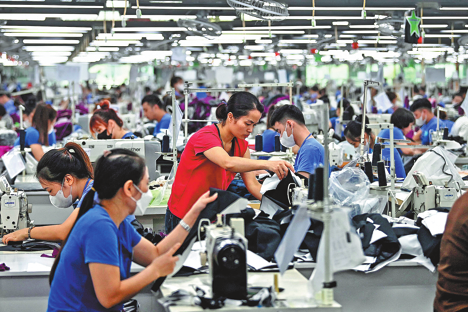Sino-African partnership can enhance global green development

Climate change has emerged as the single greatest development challenge of our time, threatening to reverse decades of progress across the Global South. Nowhere is this more evident than in Africa, which contributes less than 4 percent of global emissions yet bears a disproportionate burden of the crisis.
According to the African Development Bank, climate change already costs the continent between 3 percent and 5 percent of GDP each year, undermining growth and deepening vulnerabilities. At the same time, this crisis has created new avenues for international cooperation. In this context, Africa's partnership with China has taken on renewed significance.
The Ghana-China Climate Summit in September demonstrated the appetite and momentum for deeper collaboration. Building on the Beijing Action Plan of the Forum on China-Africa Cooperation, the task ahead is clear: Translate commitments into concrete action for a greener future.
Africa stands at the front line of the climate crisis. Despite contributing a small proportion of global greenhouse gas emissions, the continent is warming faster than the global average. Rising temperatures, erratic rainfall patterns, desertification and frequent floods are not abstract projections — they are realities disrupting agriculture, water resources and public health.
The Intergovernmental Panel on Climate Change warns that by 2030, up to 118 million extremely poor people in Africa will face heightened risks from droughts, floods and extreme heat. Agriculture, which provides livelihoods for nearly 60 percent of Africans, is especially vulnerable, threatening food security and rural incomes.
Meeting these challenges requires financing and innovation at scale. Yet Africa faces a staggering climate finance gap of $277 billion annually by 2030. This stark imbalance underscores the urgency of partnerships that mobilize resources, technology and resilience.
China has become a global leader in green development. It is the world's largest investor in renewable energy, accounting for nearly half of global clean energy spending in 2023. It leads in solar panel and wind turbine production, as well as in the expansion of electric vehicles. Internationally, China has pledged to halt financing for new coal projects abroad and to accelerate renewable energy cooperation through the Belt and Road Initiative's Green Development Coalition.
China-Africa climate cooperation is no longer confined to policy declarations; it is increasingly visible on the ground. Across the continent, Chinese financing and technology are helping drive renewable energy transitions.
In Kenya, the Garissa Solar Power Plant, one of the largest in East Africa, was built with Chinese support and now provides clean electricity to tens of thousands of households.
In Ethiopia, Chinese companies have partnered on major hydropower projects, such as the Gibe III dam, contributing to the country's low-carbon energy ambitions. And in South Africa, Chinese investment has been pivotal in scaling up wind farms and advancing the electric vehicle value chain.
Beyond infrastructure, cooperation is also emerging in green finance and knowledge-sharing. The Sino-African Green Finance Alliance, for example, is creating platforms for African and Chinese institutions tomobilize climate finance and foster sustainable investment.
Africa possesses 60 percent of the world's best solar resources but only 1 percent of installed capacity. Cooperation with China can accelerate deployment of solar, wind and hydropower. A crucial step is localizing the manufacturing of panels, turbines and EV batteries to create jobs while decarbonizing Africa's energy mix.
China's experience in climatesmart agriculture, irrigation and disaster early warning systems can be adapted to African contexts. Investments in resilient food systems and water management will protect rural livelihoods most exposed to climate shocks.
Sustainable cooperation requires knowledge-sharing. Establishing joint research centers, scholarships and training programs for African engineers, scientists and policymakers will build the human capital needed to sustain Africa's green transition long after projects are commissioned.
By mobilizing finance, technology and human capital, Africa and China can co-create a model of cooperation that inspires the world. The future of global green development may well depend on how boldly both sides act today.
The author is founder and executive director of the Africa-China Centre for Policy and Advisory, a Sino-African research and policy think tank based in Accra, Ghana.
The views do not necessarily reflect those of China Daily.































